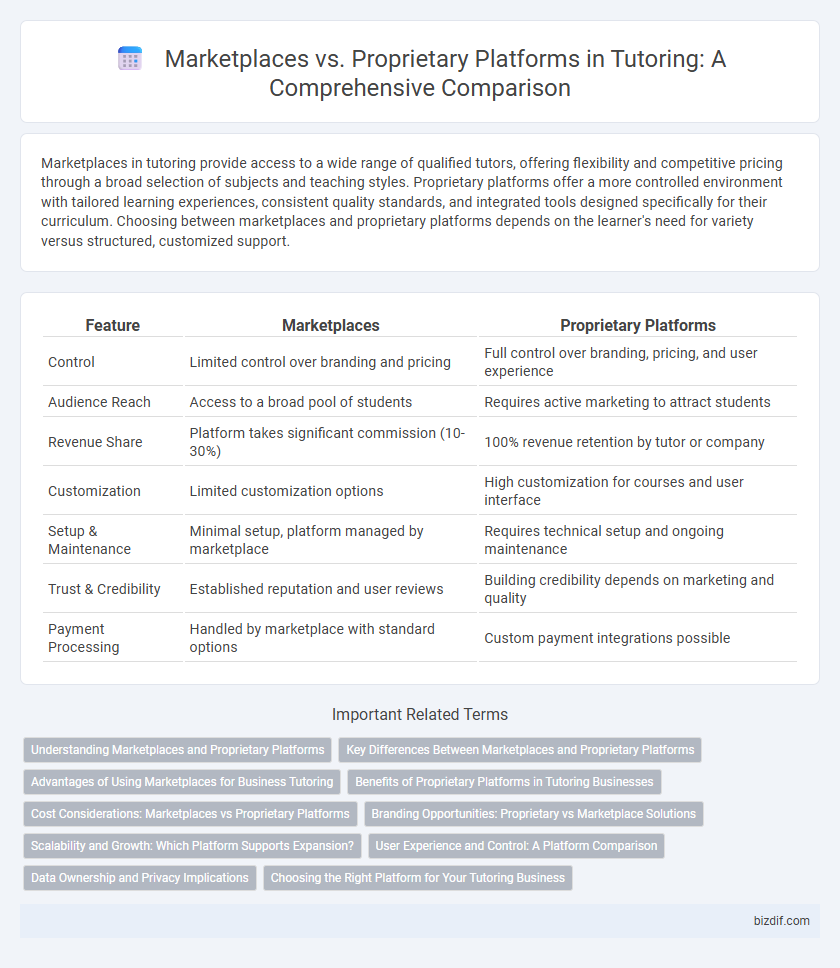Marketplaces in tutoring provide access to a wide range of qualified tutors, offering flexibility and competitive pricing through a broad selection of subjects and teaching styles. Proprietary platforms offer a more controlled environment with tailored learning experiences, consistent quality standards, and integrated tools designed specifically for their curriculum. Choosing between marketplaces and proprietary platforms depends on the learner's need for variety versus structured, customized support.
Table of Comparison
| Feature | Marketplaces | Proprietary Platforms |
|---|---|---|
| Control | Limited control over branding and pricing | Full control over branding, pricing, and user experience |
| Audience Reach | Access to a broad pool of students | Requires active marketing to attract students |
| Revenue Share | Platform takes significant commission (10-30%) | 100% revenue retention by tutor or company |
| Customization | Limited customization options | High customization for courses and user interface |
| Setup & Maintenance | Minimal setup, platform managed by marketplace | Requires technical setup and ongoing maintenance |
| Trust & Credibility | Established reputation and user reviews | Building credibility depends on marketing and quality |
| Payment Processing | Handled by marketplace with standard options | Custom payment integrations possible |
Understanding Marketplaces and Proprietary Platforms
Marketplaces connect tutors and students through a centralized platform offering a wide range of subjects and flexible booking options, often featuring reviews and ratings to ensure quality. Proprietary platforms provide tutors with dedicated, branded environments tailored to specific curricula or teaching styles, enabling more control over content delivery and pricing. Choosing between marketplaces and proprietary platforms depends on the balance between broad reach versus tailored experiences and autonomy in tutoring services.
Key Differences Between Marketplaces and Proprietary Platforms
Marketplaces aggregate a wide range of tutors and subjects, offering users diverse options and competitive pricing through multiple providers. Proprietary platforms typically feature curated tutors with standardized pricing, delivering consistent quality and streamlined user experiences. Marketplaces rely on user reviews and ratings to establish credibility, while proprietary platforms emphasize brand reputation and in-house quality control.
Advantages of Using Marketplaces for Business Tutoring
Marketplaces for business tutoring offer access to a diverse pool of qualified tutors and clients, facilitating rapid client acquisition and expanded market reach. The built-in review and rating systems enhance credibility and trust, improving tutor visibility and booking rates. Furthermore, marketplaces provide streamlined payment processing and scheduling tools, reducing administrative burdens and allowing tutors to focus on delivering quality instruction.
Benefits of Proprietary Platforms in Tutoring Businesses
Proprietary platforms in tutoring businesses offer enhanced customization, allowing tutors to tailor features and user interfaces specifically for their teaching methods and student needs. These platforms provide greater data control and security, ensuring sensitive student information remains confidential and protected. Exclusive access to integrated tools such as scheduling, payment processing, and progress tracking streamlines operations and improves the overall learning experience.
Cost Considerations: Marketplaces vs Proprietary Platforms
Marketplaces often lower upfront costs by connecting tutors and students directly, eliminating the need for platform maintenance and development expenses. Proprietary platforms require significant investment in technology, customization, and ongoing support, increasing overall costs but providing tailored user experiences. Evaluating cost considerations involves balancing the affordability and scalability of marketplaces against the control and branding advantages of proprietary platforms.
Branding Opportunities: Proprietary vs Marketplace Solutions
Proprietary tutoring platforms offer exclusive branding opportunities, allowing tutors to create a personalized online presence that enhances visibility and builds client trust. Marketplaces provide broader reach but often limit customization, causing tutors to compete in a crowded environment under a shared brand. Investing in a proprietary platform cultivates stronger brand identity, leading to higher client retention and long-term business growth.
Scalability and Growth: Which Platform Supports Expansion?
Marketplaces leverage vast networks of tutors and students to rapidly scale through user-generated content and peer reviews, facilitating organic growth and market penetration. Proprietary platforms offer controlled ecosystems with customized tools, enabling tailored service expansion but often require significant investment for scaling infrastructure and user acquisition. Scalability in marketplaces benefits from network effects, while proprietary platforms excel in optimized user experience and brand consistency, influencing the trajectory of sustainable growth.
User Experience and Control: A Platform Comparison
Marketplaces offer tutors and students access to a broad audience with streamlined booking and payment systems, enhancing convenience but limiting customization and direct communication control. Proprietary platforms provide tailored user experiences, enabling tutors to customize branding, pricing, and engagement methods, resulting in greater control over client interactions. User experience on proprietary platforms tends to be more personalized, while marketplaces trade some control for wider exposure and ease of use.
Data Ownership and Privacy Implications
Tutoring marketplaces collect extensive data from tutors and students, often retaining ownership and using this information for targeted marketing and platform optimization, raising concerns about user privacy and limited data control. Proprietary platforms typically grant users greater control over their data, allowing tutors to manage client information and communication privately, enhancing data security and user trust. Understanding the implications of data ownership is crucial when choosing between marketplaces and proprietary platforms to ensure compliance with privacy regulations and protect personal information.
Choosing the Right Platform for Your Tutoring Business
Evaluating marketplaces and proprietary platforms is essential for optimizing your tutoring business's reach and control. Marketplaces offer access to large audiences and simplified client acquisition, while proprietary platforms provide full branding control and tailored features for personalized services. Selecting the right platform depends on your priorities for scalability, client engagement, and brand independence.
Marketplaces vs Proprietary Platforms Infographic

 bizdif.com
bizdif.com